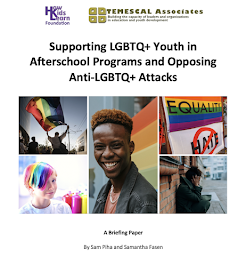By Guest Blogger: Rebecca Fabiano, MSED, Executive Director of FAB Youth Philly
I saw this tweet several years ago and it’s stayed with me: “Structure provides predictability. Predictability enables preparation. Preparation raises confidence. Confidence is energy.” It made me think about the ways afterschool and out-of-school time (OST) programs use rituals and routines to achieve similar results for the children and youth we serve. They even often benefit our adult staff.
Routines are the day-to-day habits that help create and maintain structure and predictability, thus, leading to better preparation. This could be standing at the door and saying hello to everyone as they enter your space.
Or adhering to a specific schedule, daily chores, etc. Routines create a sense of predictability, which is very important to children and youth of all ages.
“Predictability, or being able to know what to expect, is an important ingredient for healthy development. Predictable routines and consistent relationships provide a foundation of trust and security for children. When children know what to expect and who they can rely on, they have the confidence to explore the world around them and develop new skills.” - Future Learn, Predictability and Development
Predictability can help children who need consistency every day to stay on task, and routines can help reduce off-task behaviors, especially during transitions, which is when children tend to be most off track (think in between classes in the hallways, transitioning from independent stations to group work). Predictability provides those who need a sense of control something they can count on. Routines also become the ‘boss’ and they can diminish arguments about what is and isn’t fair, and what is and isn’t going to happen, or how it is or isn’t going to happen. This is important both for younger children who care about right and wrong from the perspective of concrete thinking to older teens who are trying to understand the nuances of right and wrong.
“Predictability is a stabilizing force for teens, but it’s been disrupted by the pandemic.” - Teen Mental Health: A Vulnerable Stage of Life
Here are a few more examples of routines you may expect to see in an OST program:
- Procedures are in place for getting materials, sharpening pencils, discarding paper, etc.
- Group leaders use signals and/or cues (clapping, music, chimes, quotes, etc.) to gain students’ attention.
- Expectations for productive group work are established and clearly communicated orally and/or in writing.
Adults benefit from routines too (and naps!), and the predictability of them can help them to better prepare. Having a deadline to submit lesson plans, a weekly learning community meeting with peers, scheduled prep time, are all examples of routines that provide structure for adults. Think about how more confident you often feel when you are prepared. Children and youth also feel more confident when they are prepared. OST programs by nature are designed to help children and youth to build confidence and that happens most when we implement intentional strategies like rituals and routines.
 |
| Source: Ever Forward Club |
Different from a routine (the day-to-day things that create predictability), a ritual is something that has special meaning. For example, on the first day of the program, roll out a ‘red carpet’ and have people dance into the building or classroom. Decorate a classroom or library door to celebrate historical figures during Black History Month. When distributing certificates of completion, give them out in alphabetical order by participant to participant, starting with the person with the last name starting with an “A” and them giving the certificate to the person with the last name starting with a “B”; and have that person give to the person with a last name starting with “C” and so on. Rituals can also be energizing because they evoke a different energy from the day-to-day routines. Think campfires at the end of a long week of summer camp, or an end of semester talent showcase by the senior class.
If you’re looking to re-energize your OST program, or to inspire more confidence, or looking to add a little more structure to your program, take some time to assess what rituals and routines you have in place. Ask your staff if they have any favorite rituals from when they were in school, or summer camp or as an OST participant themselves. Try them out! Assess whether your current routines are effectively creating structure and predictability, or if they just create bureaucracy. If people aren’t feeling prepared or energized by them, maybe it’s time to find new routines for your OST program.
[Note: Pictures and quotes added by Temescal Associates.]
MORE ABOUT…
For nearly 25 years, Rebecca Fabiano has worked in various capacities across nonprofit and youth-serving organizations, served on boards and helped to build solid youth programs that engage, encourage, and create spaces for positive development. As a program leader, she has successfully raised funds and managed program budgets; hired and supervised staff; developed and sustained strong community partnerships and designed award-winning programming.
Fab Youth Philly (FYP) has a unique, holistic model for youth development. Their three-pronged approach to youth development is aimed at creating relevant, engaging, and empowering learning opportunities at the individual, professional, and community level. First, they provide innovative, award-winning summer and afterschool programs for teens with a focus on workforce development programming. Second, they connect with youth development professionals working with or on behalf of youth through their Center for Youth Development Professionals (CYDP), which offers competency-based professional development and networking opportunities. Third, they consult with other youth-serving organizations to provide a range of consulting services, ranging from curriculum development to retreats and small conferences.
To see additional tools to ensure a sense of safety for all youth, see our Youth Development Guide 2.0 here. Also, a new briefing paper on supporting LGBTQ youth. Feel free to share this resource with your network.








No comments:
Post a Comment